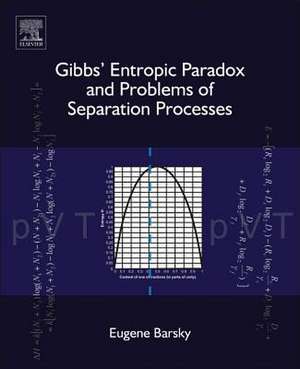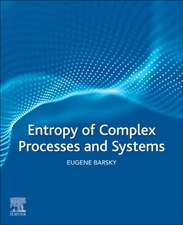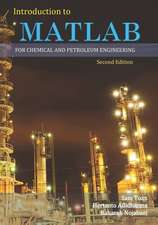Gibbs' Entropic Paradox and Problems of Separation Processes
Autor Eugene Barskyen Limba Engleză Paperback – 24 mar 2017
The book clearly shows that entropy consists of two parts, static and dynamic. Up to now, entropy has been connected only with the process dynamics. However, the Gibbs paradox is caused by the change in the static component of entropy. Finally, the book includes examples of separation processes and how to optimize them in various fields, including biology, cosmology, crystallography and the social sciences.
- Provides a precise definition of entropy and allows the formulation of criteria for optimization of separation processes
- Explains the role of entropy in many processes, facilitating an in-depth analysis and understanding of complicated systems and processes
- Provides solutions to scientific and applied problems in various scientific disciplines related to separation processes
- Elucidates entropy’s role in many separation systems
Preț: 925.03 lei
Preț vechi: 1016.52 lei
-9% Nou
Puncte Express: 1388
Preț estimativ în valută:
177.02€ • 192.22$ • 148.70£
177.02€ • 192.22$ • 148.70£
Carte tipărită la comandă
Livrare economică 15-29 aprilie
Preluare comenzi: 021 569.72.76
Specificații
ISBN-13: 9780444639196
ISBN-10: 0444639195
Pagini: 202
Dimensiuni: 191 x 235 mm
Greutate: 0.35 kg
Editura: ELSEVIER SCIENCE
ISBN-10: 0444639195
Pagini: 202
Dimensiuni: 191 x 235 mm
Greutate: 0.35 kg
Editura: ELSEVIER SCIENCE
Public țintă
students, doctoral candidates and scientists and specialists in the fields of thermodynamics statistical physics; biology; crystallography; astronomy; all other fields using the entropy parameter; mining engineering; metallurgy; electronics; modern ceramics;Cuprins
1. Peculiarities of Thermodynamic Regularities Formation
2. Brief Review of Thermodynamic Regularities
3. The Gibbs Paradox and Attempts of Its Solution
4. Solution of the Gibbs Paradox and Related Problems
5. Available Quality Criteria for Separation Processes
6. Generalized Optimization Criterion for Separation Processes
7. Multistage Separation Mechanism
8. Practical Application of the Obtained Results
9. Analysis of the Obtained Results and Summing-up
2. Brief Review of Thermodynamic Regularities
3. The Gibbs Paradox and Attempts of Its Solution
4. Solution of the Gibbs Paradox and Related Problems
5. Available Quality Criteria for Separation Processes
6. Generalized Optimization Criterion for Separation Processes
7. Multistage Separation Mechanism
8. Practical Application of the Obtained Results
9. Analysis of the Obtained Results and Summing-up





